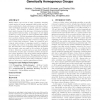1258 search results - page 231 / 252 » Architecture-driven Problem Decomposition |
124
Voted
GECCO
2010
Springer
15 years 7 months ago
2010
Springer
Within nature, the success of many organisms, including certain species of insects, mammals, slime molds, and bacteria, is attributed to their performance of division of labor, wh...
106
Voted
BMCBI
2008
15 years 2 months ago
2008
Background: This article provides guidelines for selecting optimal numerical solvers for biomolecular system models. Because various parameters of the same system could have drast...
169
click to vote
AAMAS
2005
Springer
15 years 2 months ago
2005
Springer
Cooperative multi-agent systems are ones in which several agents attempt, through their interaction, to jointly solve tasks or to maximize utility. Due to the interactions among t...
112
click to vote
TASE
2008
IEEE
15 years 2 months ago
2008
IEEE
Group elevator scheduling has long been recognized as an important problem for building transportation efficiency, since unsatisfactory elevator service is one of the major complai...
124
click to vote
HEURISTICS
2010
14 years 11 months ago
2010
This paper investigates an adaptive constructive method for solving nurse rostering problems. The constraints considered in the problems are categorised into three classes: those t...

